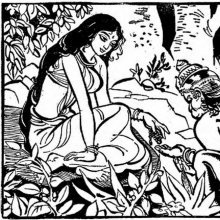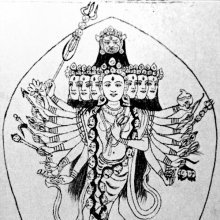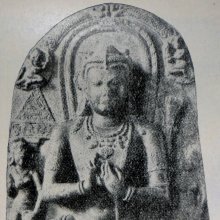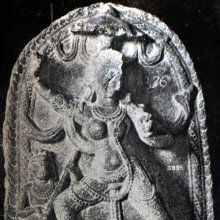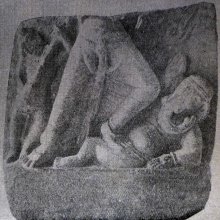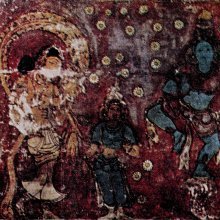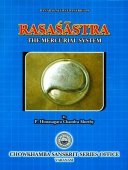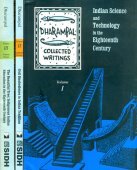Doubt: 1 definition
Introduction:
Doubt means something in the history of ancient India. If you want to know the exact meaning, history, etymology or English translation of this term then check out the descriptions on this page. Add your comment or reference to a book if you want to contribute to this summary article.
Images (photo gallery)
(+8 more images available)
India history and geography
Source: Singhi Jain Series: Ratnaprabha-suri’s Kuvalayamala-katha (history)Doubts (about the scriptures) were investigated by those pursuing the spiritual life in the Hermitages (or Ashrams) of ancient India, as vividly depicted in the Kathās (narrative poems) such as Uddyotanasūri in his 8th-century Kuvalayamālā (a Prakrit Campū, similar to Kāvya poetry).—Page 87.20-28: Here is a vivid description of the intellectual and spiritual life in the Aśrama of a Jaina Muni. Uddyotanasūri gives a list of twenty-one methods of study and discussions and approaches to the tenets of religion and philosophy, [e.g., interrogating about points of doubts about the scriptures] [...]. Also see the description of the hermitage of Divākara Mitra described by Bāṇa in the Harṣacarita.

The history of India traces the identification of countries, villages, towns and other regions of India, as well as mythology, zoology, royal dynasties, rulers, tribes, local festivities and traditions and regional languages. Ancient India enjoyed religious freedom and encourages the path of Dharma, a concept common to Buddhism, Hinduism, and Jainism.
See also (Relevant definitions)
Ends with: Sceptical Doubt, Skeptical Doubt.
Full-text (+1606): Samshaya, Samdeha, Vicikitsa, Shanka, Asanka, Chinnasamshaya, Vitarka, Asamshaya, Vicikiccha, Samshayanivritti, Bhranti, Chettri, Reka, Vikalpa, Hum, Vicarana, Sandigdha, Vitarkana, Shankita, Chinnadvaidha.
Relevant text
Search found 456 books and stories containing Doubt; (plurals include: Doubts). You can also click to the full overview containing English textual excerpts. Below are direct links for the most relevant articles:
Abhidhamma in Daily Life (by Ashin Janakabhivamsa) (by Ashin Janakabhivamsa)
Factor 14 - Vicikiccha (doubt, scepticism) < [Chapter 2 - On akusala cetasikas (unwholesome mental factors)]
Factor 1 - Saddha (faith) < [Chapter 3 - On kusala cetasikas (wholesome mental factors)]
Chapter 2 - On akusala cetasikas (unwholesome mental factors)
The Question of Doubt and Faith < [April 1965]
Poetry in the Gita < [July 1967]
Poetry in the Gita < [July 1967]
A History of Indian Philosophy Volume 4 (by Surendranath Dasgupta)
Part 3 - Tarka (ratiocination) < [Chapter XXVIII - Madhva Logic]
Part 4 - Illusion and Doubt < [Chapter XXVII - A General Review of the Philosophy of Madhva]
Part 3 - Svataḥ-prāmāṇya (self-validity of knowledge) < [Chapter XXVII - A General Review of the Philosophy of Madhva]
Mahabharata (English) (by Kisari Mohan Ganguli)
Section XXXI < [Arjunabhigamana Parva]
Section XLIX < [Anugita Parva]
Section CCXXXVIII < [Mokshadharma Parva]
The Tattvasangraha [with commentary] (by Ganganatha Jha)
Verse 1169-1170 < [Chapter 16 - Examination of the Import of Words]
Verse 3297-3298 < [Chapter 26 - Examination of the ‘Person of Super-normal Vision’]
Verse 1166 < [Chapter 16 - Examination of the Import of Words]
Alamkaras mentioned by Vamana (by Pratim Bhattacharya)
11: Definition of Sandeha Alaṃkāra < [Chapter 4 - Arthālaṃkāras mentioned by Vāmana]
4: Content of the work (Kāvyālaṃkārasūtra-vṛtti) < [Chapter 1 - Introduction]
9: Definition of Utprekṣā Alaṃkāra < [Chapter 4 - Arthālaṃkāras mentioned by Vāmana]
Related products
(+3 more products available)
